By Christine Imarenezor
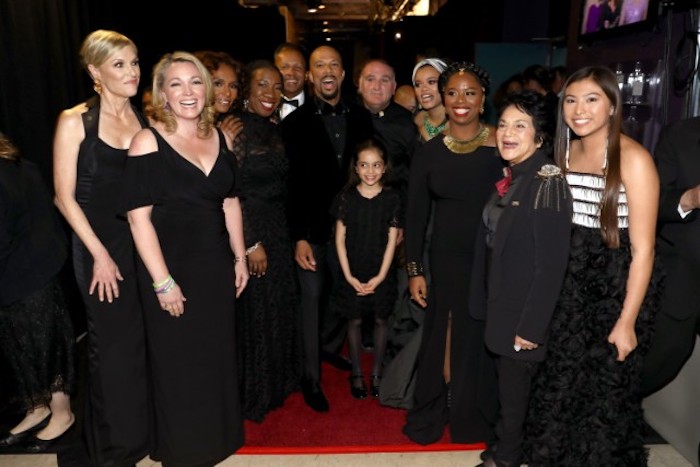
CREDIT: Matt Sayles/A.M.P.A.S
Much like many nominees and winners at the annual Academy Awards, rapper Common and singer Andra Day used the live televised broadcast as an opportunity to shed light on important issues through a song performances. At the 2018 Oscars, the duo did just that and spotlighted 10 unsung heroes and activists of today who have made a difference in society and beyond.
Andra and Common shared their thoughts on their decision to celebrate those in the trenches of activism and politics, fighting to make a difference in the lives of others.
“I am truly honored to share the stage with such powerful people. People who work, sacrifice and have fought through their personal pain to make the world a better place,” shared Andra in a statement. “Everyone’s contribution is important, but Common and I wanted to show people who are working everyday in the trenches to transform perceptions, circumstances, legislation, social and political landscapes, and bring hope to the hopeless.”
Common pointed out how many of the activists who stood on stage with them took action because of “their own personal experiences” and because of the injustices they saw “going on in the world.”
“We wanted to take our gratitude and connect it to a movement that is bigger than us,” shared the Chicago native. “We started thinking of ways we could highlight activists and acknowledge those who are on the frontline and on the ground every day doing the work to change the world.”
“If it’s one thing I learned from being a part of Selma it is that an activist is someone who lives their life for what they believe in and works for that cause every day. The activists we asked to join us on stage are people who have dedicated their lives to making the world better,” the actor continued.
To keep the focus on the honored and “unsung heroes,” here is a list of who they are as well as what they stand for. Scroll down and get familiar.
—
1. Alice Brown Otter
Mini Bio: Alice Otter, 14, has been a powerful voice of the Standing Rock youth spearheading the #NoDAPL movement. In the summer of 2016, at age 12, she ran 1,519 miles from Standing Rock Sioux Reservation in North Dakota to the front steps of the Army Corp of Engineers office in Washington, D.C., to protest the construction of the Dakota Access Pipeline. Alice strives to remain a positive role model for Native youth through several youth organizations like Woihanble (Dream) and the Standing Rock Youth Council. She is dedicated to keeping the Lakota language and culture alive by living Lakota values and teachings.
Follow The Fight: @alicebrownotter (Instagram) – @alice.brownotter (Facebook)
2. Bana Alabed
Mini Bio: Bana Alabed, 8, is a Syrian refugee from Aleppo, known worldwide for her tweets during the siege of the city in 2016 and for her subsequent calls for peace and an end to all global conflict. Her tweets have earned her legions of admirers around the world by giving a remarkable insight into the daily horrors of life in the city, including airstrikes, hunger, and the prospect of her family’s death. Her book, DEAR WORLD: A Syrian Girl’s Story of War and Plea for Peace (released October 2017) is not just a gripping account of a family endangered by war—it also offers a uniquely intimate, child’s-eye perspective on one of the biggest humanitarian crises in history. J.K. Rowling aptly describes it as “a story of love and courage amid brutality and terror.”
Follow The Fight: @AlabedBana (Twitter)
3. Bryan Stevenson
Mini Bio: Bryan Stevenson, 58, is the director of the Equal Justice Initiative and the author of Just Mercy. Mr. Stevenson and EJI have won relief for scores of people who were wrongly convicted or unfairly sentenced. EJI is committed to ending mass incarceration and excessive punishment in the United States, to challenging racial and economic injustice, and to protecting basic human rights for the most vulnerable people in American society. On April 26, 2018 EJI will open the National Memorial for Peace and Justice and The Legacy Museum: From Enslavement to Mass Incarceration.
Follow The Fight: @eji_org (Twitter) – @eji_org (Instagram) – @equaljusticeinitiative(Facebook)
4. Cecile Richards
Mini Bio: Cecile Richards, 60, has been a lifelong activist for women’s rights and social justice, including more than a decade as president of Planned Parenthood Federation of America and Planned Parenthood Action Fund. She is standing up for the right of every woman – regardless of race, income, sexual orientation, or immigration status – to get the health care she needs, including reproductive health care; access affordable childcare and paid family leave; earn a living wage; live and work without facing harassment or abuse; raise families in safe communities with excellent public schools; make her voice heard in the voting booth; and more.
Follow The Fight: @CecileRichards (Twitter) – @cecilerichards (Instagram)
5. Dolores Huerta
Mini Bio: Dolores Huerta, 87, is the president and founder of the Dolores Huerta Foundation (DHF) since 2003 and co-founded the United Farm Workers of America with Cesar Chavez in 1962. DHF is connecting groundbreaking community-based organizing to state and national movements to register and educate voters; advocate for education reform; bring about infrastructure improvements in low-income communities; advocate for greater equality for the LGBT community; and create strong leadership development. She has received numerous awards: among them The Eleanor Roosevelt Humans Rights Award in l998 and The Presidential Medal of Freedom in 2012. DOLORES, the acclaimed documentary about the life and work of Dolores Huerta, premieres on INDEPENDENT LENS on PBS March 27th.
Follow The Fight:: @DoloresHuerta, @Dolores_Movie, and @DoloresHuertaFD (Twitter) – @doloreshuerta, @doloresthemovie, and @doloreshuertafdn (Instagram) – @DoloresClaraHuerta, @doloresthemovie and @DoloresHuertaFoundation (Facebook)
6. Janet Mock
Mini Bio: Janet Mock is the NY Times bestselling author of two memoirs, Redefining Realness and Surpassing Certainty, which broke ground by centering her journey as a young trans woman. Mock spoke at the Women’s March on Washington and founded #GirlsLikeUs, a project that empowers trans women. Mock has been named one of Variety’s “Power of Women,” included on Ebony’s Power 100 List, honored at the 2017 Literary Awards by the PEN Center USA, and called one of “12 new faces of black leadership” in TIME, and is currently making TV history as the first trans woman of color to write & produce for television with Ryan Murphy’s FX series Pose.
Follow The Fight: @janetmock (Twitter) – @janetmock (Instagram) – @janetmock (Facebook)
7. José Andrés
Mini Bio: José Andrés, 48, is named one of Time’s “100 Most Influential People”, “Outstanding Chef” and “Humanitarian of the Year” by the James Beard Foundation. He is an internationally-recognized culinary innovator, author, educator, television personality, humanitarian and chef/owner of ThinkFoodGroup. As a naturalized citizen, originally from Spain, he’s been a tireless advocate for immigration reform as well. Together with World Central Kitchen and #ChefsforPuertoRico, Andrés served over 3.3 million meals in Puerto Rico following the devastation of Hurricane Maria in 2017, reaching communities in need across all 78 municipalities through 23 kitchens. Andrés’ work has earned numerous awards including the 2015 National Humanities Medal, one of 12 distinguished recipients of the award from the National Endowment for the Humanities.
Follow The Fight: @chefjoseandres (Twitter), @chefjoseandres (Instagram) – @chefjoseandres (Facebook)
8. Nicole Hockley
Mini Bio: Nicole Hockley, mother of Dylan Hockley who was tragically killed in the Sandy Hook Shooting, is the Founder and Managing Director for Sandy Hook Promise (SHP)- the national non-profit organization founded and led by several family members who lost loved ones at Sandy Hook Elementary School in 2012. Hockley has worked to enable social change and promote gun violence prevention. She has lead SHP to educate and train over 3 million youths, teens, and adults in all 50 states through the organization’s four proven “Know the Signs” programs. Hockley was named one of PEOPLE’s 25 Women Changing the World by PEOPLE Magazine in 2016, received The Common Good American Spirit Award for Citizen Activism in 2013 and most recently nominated for the 2018 People’s Choice Award for Change Makers, by the Child Mind Institute.
Follow The Fight: @NicoleHockley & @sandyhook (Twitter) – @sandyhookpromise (Instagram) – @SandyHookPromise (Facebook)
9. Patrisse Cullors
Mini Bio: Patrisse Cullors, 34, is an artist, organizer, and freedom fighter from Los Angeles, CA and co-founder of the Black Lives Matter Global Network. She is a New York Times Best Selling Author, popular public speaker, and Fulbright scholar. The Black Lives Matter Global Network is a member-led global network of nearly 40 chapters in the US, Canada, and the United Kingdom, and has received prestigious awards including the Sydney Peace Prize. Since its inception in 2013, the BLM Global Network has changed the global conversation around racial justice, gender justice and economic justice. As a part of the Movement for Black Lives, the Black Lives Matter Global Network and its members organize and build local power to intervene in violence inflicted on Black communities by the state and vigilantes.
Follow The Fight: @OsopePatrisse & @blklivesmatter (Twitter) – @OsopePatrisse& @blklivesmatter (Instagram) – @OsopePatrisse &@BlackLivesMatter (Facebook)
10. Tarana Burke
Mini Bio: Tarana Burke, 45, is an American civil rights activist who works at the intersection of racial justice and sexual violence. Fueled by commitments to interrupt sexual violence and other systemic inequalities disproportionately impacting marginalized people, particularly black women and girls, Burke has created and led various campaigns focused on increasing access to resources and support for impacted communities. She is the founder of the “Me Too” movement, which raises awareness of sexual violence, predominantly young women of color from low wealth communities, find pathways to healing.
Follow The Fight: @TaranaBurke (Twitter) – @taranajaneen (Instagram)
Watch all the activists in Andra Day and Common’s Oscars performance of “Stand Up For Something” from Marshall here.
Comment
+ Permalink
By RUSS BURLINGAME
When Edgardo Miranda-Rodriguez brings his superheroine La Borinqueña teams up with the heroes of the DC Universe to help deal with the impact of Hurricane Maria on Puerto Rico, some unexpected faces will be in the crowd of heroes coming to the island’s aid.
In a story co-written with Reginald Hudlin for Ricanstruction: Reminiscing & Rebuilding Puerto Rico, Miranda-Rodriguez will bring Static and Icon back into print for the first time in years — and legendary artists Denys Cowan, Bill Sienkiewicz, colorist Chris Sotomayor and letterer Taylor Esposito will be right there with them.
“I got to write with Reggie Hudlin, who’s a great writer and filmmaker and storyteller in his own right,” Miranda-Rodriguez told ComicBook.com. “We got to write a Milestone story together, and I got Denys Cowan to write it and Bill Sienkiewicz to ink it and Chris Sotomayor to color it!”
The story represents the first time Milestone characters have been seen in the DC Universe in several years, and the first time Hudlin will write the “new Milestone” characters since DC announced that he would be spearheading their revival effort. For Cowan, the story will be his first rendition of the Milestone characters in nearly a decade.
“Reggie and I have been talking about that for a while,” Miranda-Rodriguez admitted. “I was like, ‘wow, this has got to be good. Nobody has seen these characters in an actual story in years.’ Even though they’re doing Milestone this year, this is the first time people have seen these characters.”
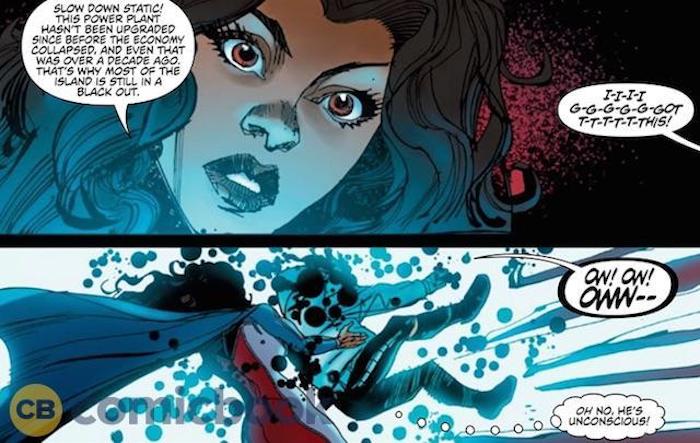
Milestone is planned to make its return to DC’s publishing line later this year as part of the Earth-M project, in which Milestone veterans from the past will join with new creators to bring new characters of color to the DC multiverse.
You can pre-order Ricanstruction: Reminiscing & Rebuilding Puerto Rico at Amazon. The book will be released to the public on May 23, although may make its debut at convention appearances with Miranda-Rodriguez before then.
When the imprint comes back later this year, its launch book will be titled Milestone, and will create the foundation and over-arching storyline for future Earth-M titles in the same way The Wild Storm has done for DC’s Wildstorm imprint. The series, from writer Reginald Hudlin and artist Ken Lashley, will focus on Icon and Rocket and will feature other classic Dakota Universe characters from the ‘90s.
Panelists shared more details on other titles readers can expect, including:
Static Shock, an ongoing series from Hudlin and Kyle Baker, focusing on 14-year-old Virgil Hawkins, a kid with a love of comics and science who develops dazzling, electric superpowers.
Duo, a new Earth M miniseries written by Greg Pak, introducing the twisted story of a couple sharing one body for eternity.
Love Army, a miniseries with story by Hudlin, about a secret army of women with amazing abilities and super-strength, sworn to protect the planet.
Earth M, a new series from Hudlin and Alice Randall featuring a mysterious new vigilante character.
Comment
+ Permalink
Conference focused on artists and lawyers who use entertainment to promote stories of social injustice
by Joshua Rich
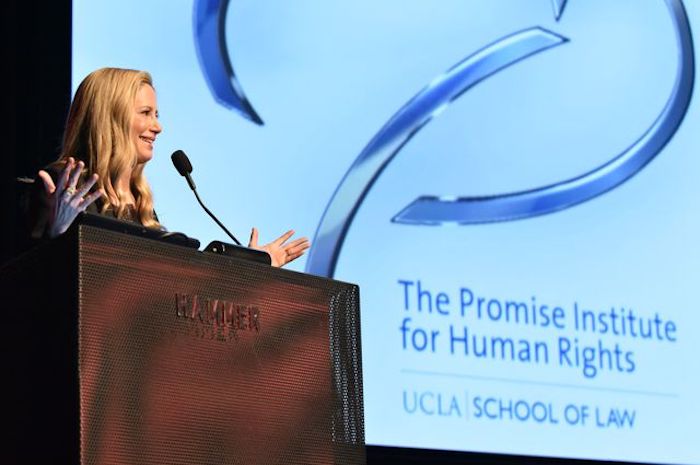
Mira Sorvino accepts the Promise Institute Award for Contribution to Human Rights Through the Arts at the March 16 summit “Lights. Camera. Reaction.: The Art of Impact in Entertainment.”
Academy Award-winning actress Mira Sorvino and a host of preeminent artists and lawyers who use movies and television to spread stories of social injustice shared the secrets of their craft at a March 16 summit at the Hammer Museum at UCLA.
Featuring panels on the law, economics and art behind works that drive social change, “Lights. Camera. Reaction.: The Art of Impact in Entertainment” was presented by the Promise Institute for Human Rights at UCLA School of Law; the Skoll Center for Social Impact Entertainment at the UCLA School of Theater, Film and Television; and the arts nonprofit Creative Armenia.
Sorvino, a United Nations goodwill ambassador and longtime campaigner against human trafficking, received the inaugural Promise Institute Award for Contribution to Human Rights Through the Arts.
In accepting the award, the “Mighty Aphrodite” star detailed the abuses faced by women she has met in her travels for the U.N. and while working on films about human trafficking. She encouraged members of the audience to take action. “The filmmakers in this room have all made incredible contributions to changing the world [by] enlightening their audiences through an artistic depiction of a terrible issue,” she said.
Sorvino also addressed her role as a leading voice in the Time’s Up movement against sexual harassment in Hollywood and other workplaces. She marveled at the collective power of women speaking out. “It’s not stopping now,” she said. “The cat is out of the bag, the Pandora’s Box has been opened, we have found a voice.”



Panelists who participated in the summit included filmmakers Edward Zwick (“Glory” and “Blood Diamond”), Amy Ziering (“The Invisible War” and “The Hunting Ground”), Dr. Eric Esrailian of the David Geffen School of Medicine at UCLA (“The Promise”), Mike Medavoy (“The Promise”), Catherine Hardwicke (“Thirteen”), Evgeny Afineevsky (“Winter on Fire”), Terry George (“The Promise” and “Hotel Rwanda”) and Reginald Hudlin (“Django Unchained” and “Marshall”); actress Angela Sarafyan (“The Promise” and “1915”); activist and public relations specialist Bonnie Abaunza; entertainment attorneys Kelli Sager of Davis Wright Tremaine and Gabriel Brakin of Participant Media; and the leaders of UCLA Law’s Documentary Film Legal Clinic, “Frontline” special counsel Dale Cohen and entertainment law specialist Daniel Mayeda.
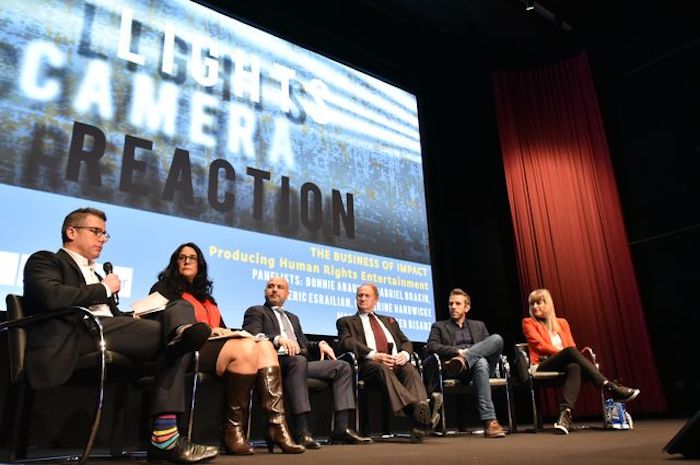
Panelists share their views on the business of social-justice entertainment.
Cohen, whose clinic offers free legal services to independent filmmakers, moderated a panel on navigating the legal minefields when making movies that confront human rights violations. The clinic’s services are increasingly vital, panelists made clear, in an era when major studios don’t produce impact movies like 2006’s “Blood Diamond,” which tackled the gem trade in war-torn Africa.
“The day in which serious fiction films [with large budgets] are made are long gone,” said “Blood Diamond” director Zwick. He elaborated that corporate entanglements and risk aversion have made it unlikely that major studios would back a film like ‘Blood Diamond’ today. “I think they’ve abdicated that to … the world of independent film and documentary.”
Cohen’s panel further explored the extensive challenges of telling such stories. Ziering spoke of protests and pressure that she received while making the documentary “The Hunting Ground,” about sexual assault on college campuses. Zwick, meanwhile, spoke about the massive PR campaign that diamond giant De Beers waged against “Blood Diamond.”
Sager and documentary clinic associate director Mayeda explained how lawyers must walk a fine line in shepherding film projects through possible litigation hazards. “The goal,” Sager said, “is to help the creative process without stepping on it, so that we’re trying to make it legally safe enough for you to do what you do without sucking all of the blood or the interest out of the project.”
Other panels featured several members of the creative team behind the 2017 movie “The Promise,” which was the first major motion picture to tell the story of the Armenian Genocide of the early 20th century. That project served the cause of social justice in two ways: It highlighted a historic atrocity that is poorly understood, and its proceeds went to support a number of human rights organizations, including the Promise Institute at UCLA Law.
Alongside “Promise” producers Esrailian and Medavoy, Skoll Center executive director Peter Bisanz moderated a discussion on the business of making movies with a message. Abaunza and Brakin, who graduated from UCLA Law in 2005, detailed how social-impact tools like music videos, retail products and strategic use of digital platforms can be key to activating audiences.
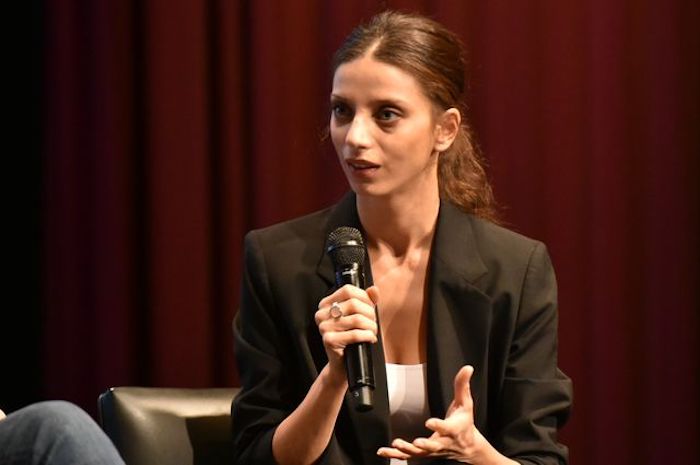
Angela Sarafyan discusses her roles in “The Promise” and “1915,” which detailed the Armenian Genocide.
“It has become more relevant than ever to be producing this type of content; there’s more audience demand for it than we’ve ever seen,” said Brakin, the general counsel and executive vice president of business affairs at Participant Media. “We’ve reached a bit of a tipping point in the corporate world, [with] companies realizing that they need to be thinking about: How does their business contribute to the public good?”
A panel on the creative process behind the making of human rights films, moderated by Creative Armenia vice president of productions and programs Alec Mouhibian, was similarly revealing. “The Promise” director George, whose films have detailed horrors in Northern Ireland, Rwanda and the Ottoman Empire, discussed how he focuses on appealing to audiences all over the world. “We are universalizing the humanity of our characters,” he said. “You have to be able to play today in Belfast, Beirut and Beijing. That’s the nature of the business, and the story needs to be therefore universalized.”
Hudlin agreed. His 2017 biopic “Marshall” sought to make legendary lawyer Thurgood Marshall broadly relatable by focusing on an intimate story from the future Supreme Court justice’s early career. For any lawyer, activist or filmmaker intent on crafting a piece of entertainment whose overriding purpose is to land with a positive impact, Hudlin said, “The truth is a very powerful weapon.”
Comment
+ Permalink
BY ADAM BANNER
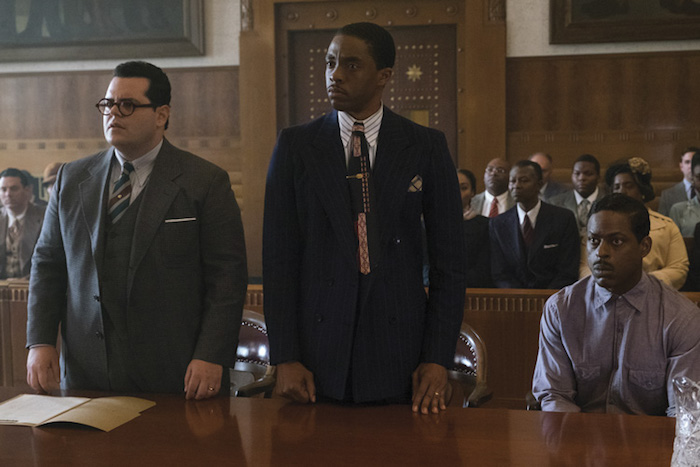
Movie still courtesy of Starlight Media and Open Road Films
I don’t think my wife likes to watch “lawyer movies” with me at the theater. I don’t blame her opposition, actually. She has to hear about the practice of law every day of her life. Why would she want to think about jury trials under the guise of “entertainment”?
To be fair, she’d go without question if I asked. She’d have a quick look on her face—the one I see for a split-second when she’s a little frustrated—but it would pass, and she’d agree. I’ve learned over time to save those slightly frustrated looks for the other movies I enjoy. Like the ones based on comic books.
Consequently, I didn’t go watch Marshall when it was first released on the big screen. I waited to rent it online. It’s worth a rent.
The film begins in Hugo, Oklahoma. As a born-and-bred Oklahoman, the scene immediately caught my attention. I’ve heard of the Billy Lyons case. To be honest, though, I’d never read too much into it. Up until this film, I had no idea Thurgood Marshall handled the trial.
INNOCENT VS. GUILTY
The film serves as an origin story of sorts for the future Justice Marshall. Marshall is a one-man legal army for the NAACP. He travels across the country trying cases for the accused. As the opening minutes unfold, he is sent to Connecticut to defend a black man accused of raping a white woman.
Once Marshall meets his new client, he begins their relationship by peppering him with questions. He wants to know if his client raped the complaining victim. He starts to interrogate him. He dispenses with pleasantries and icebreakers. He informs his new client that the NAACP will “only represent innocent people.” The client, Joseph Spell, informs Marshall that he is, in fact, innocent.
In that regard, there are two types of criminal defense trial attorneys: Those who want to know whether their clients are guilty, and those who don’t. I fall on the side of those who’d rather not know.
The sad reality of the profession is that 80 to 90 percent of my clients are lying to me about one thing or another 80 to 90 percent of the time. That’s a rough estimation. Maybe it’s a little cynical, but ultimately, it’s true. For whatever reason, even within the security of confidentiality, criminal clients aren’t typically totally truthful.
Can I ask my clients if they committed the crime? Of course. But I usually don’t. They will either tell me they did, or they’ll tell me they didn’t. There will always be an issue of culpability, and someone accused of a crime will usually voice their opinion about the accusation.
Marshall’s NAACP couldn’t represent guilty people, but I can. I’m bound by the facts, and that’s good enough for me. The guilty need attorneys too, and their attorneys need to be zealous advocates, free from bias and emotion.
Now, I can tell when clients are lying—most of the time. I’m no human lie detector, though. With that in mind, I feel like I perform my best when I take a universal approach to each and every case: It doesn’t matter whether the client is innocent; all that matters is whether the prosecution can prove to a jury beyond a reasonable doubt that the defendant is guilty. That’s why fair jurors are so important.
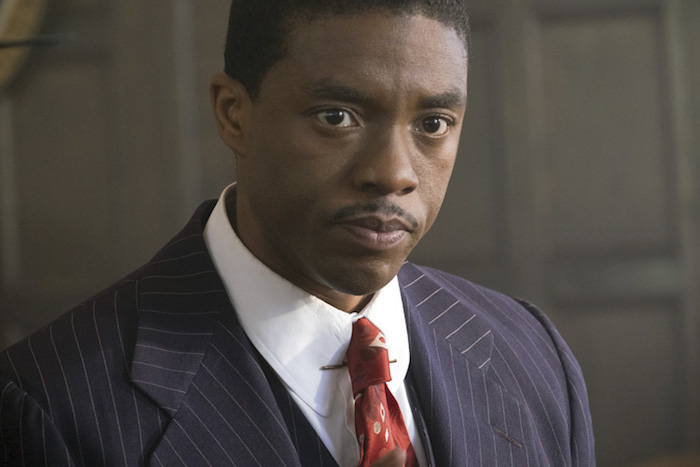
Photo of actor Chadwick Boseman as a young Thurgood Marshall courtesy of Starlight Media and Open Road Films
JURY SELECTION
But it’s not just clients who will lie to you, though. Jurors will lie as well. Transparency isn’t easy to come by. It’s not most people’s default setting.
In the film, Thurgood Marshall and his co-counsel go through a voir dire sequence. All of the individuals they speak with are remarkably candid. In a time fraught with racism and ignorance, these potential jurors have no qualms. They don’t worry about potential backlash or criticism when they explain and justify their insecurities and hatred.
Today though, one can’t vomit the same hate-speech allowed in the 1940s and get away with it. Even among those with racist tendencies, most have societal restrictions and restraints that keep them from airing their actual thoughts and feelings on race, religion, and other perceived division lines. It makes it increasingly difficult for the attorneys tasked with weeding out the bad apples.
The fact that bigotry is not as widely accepted as it was in the past does not mean it ceases to exist. There are still plenty of potential jurors, in every prospect pool, with deep-seeded demons. Some are wicked enough to actively hide them just to get on a jury.
It’s hard to uproot those prejudices through public questioning, but you have to try. At the end of the day, the goal is to get individuals who will agree to the burden and follow the law. People interpret those issues through different prisms, though, based on their feelings about the defendant’s specific characteristics. You have to understand how people view your client.
HE’S GOT BAGGAGE
Mr. Marshall’s client, Joseph Spell, is far from a perfect man. He was dishonorably discharged from the army. He was fired from his last job for stealing. He left behind his wife and two kids in Louisiana. “But none of that makes him guilty.”
Many of the defendants we defend have baggage. If no criminal ever committed another crime, there’d be a lot more room in prison and a lot less attorneys at the courthouse. But the reality of criminal law is that individuals often face the system more than once.
Sometimes, the baggage they carry isn’t even a prior conviction. Sometimes it’s just a “prior bad act” the prosecution offers to show motive, opportunity, intent, preparation, plan, knowledge, identity, absence of mistake, or lack of accident.
How do you handle the potential impeachment and negative character evidence? According to Marshall, “the jury needs to hear him deny it. And you bring out all the bad stuff yourself.”
I agree with this for the most part. I generally believe the jury wants to hear someone say: “I didn’t do it.” For me, that’s not a hard-and-fast rule, though. There are plenty of situations where I wouldn’t put a client on the stand unless he or she demanded it. Sometimes the potential benefit is outweighed by the potential detriment.
Others live and die by the mantra that the “client must speak.” Early in my career I had a boss who wanted every defendant to take the stand. He firmly believed that it was next to necessary that the accused testify under oath. Yet, sometimes it’s better for the defendant not to speak. Maybe there’s a ton of baggage. Maybe the prosecution’s case is so weak there’s no need for the defendant to testify.
The movie is spot-on though: if your client is going to testify, take the air out of the prosecution.
Embrace the bad stuff.
LAST-MINUTE PLEA OFFERS
In the film, the prosecution makes various plea offers throughout the trial. This is one of the most difficult aspects of criminal defense trial practice. I’ve had prosecutors make new plea offers during trial. This is almost always an indication things aren’t going quite the way they planned.
Maybe a witness didn’t come off as well as expected. Maybe skillful cross-examination exposed a problem the prosecution can’t patch. There will be times during trial when a deal too good to pass up gets placed on your platter. What do you do?
The easy (and sometimes smart) option is to urge your client to take the definite deal as opposed to risking an unknown verdict. There is nothing more difficult than a client questioning whether he or she should take a sweetheart plea offer during trial.
It’s tough to tell someone they shouldn’t take a misdemeanor conviction and probation when he or she is staring down the barrel of a felony that carries decades in prison. A definite resolution is a beautiful thing. There is security in knowing the outcome. Waiting out twelve strangers is a lonely experience.
But to fight for an entire trial just to settle? That is a tough pill to swallow. Usually, by that time, the hard work is over with. Still, it’s the client’s decision to accept or decline a plea offer. Nevertheless, they will usually ask for your opinion.
Again, the movie is pretty spot on: Don’t admit to it if you didn’t do it.
Overall, Marshall was a pretty solid viewing experience. It had some nice comedic undertones, the “legalese” wasn’t underdone or overblown, and I kept thinking Black Pantherwas going to burst on to the screen and take out some of the racist townsfolk. Apparently Chadwick Boseman is a great actor, regardless of what kind of suit he is wearing.
Comment
+ Permalink










